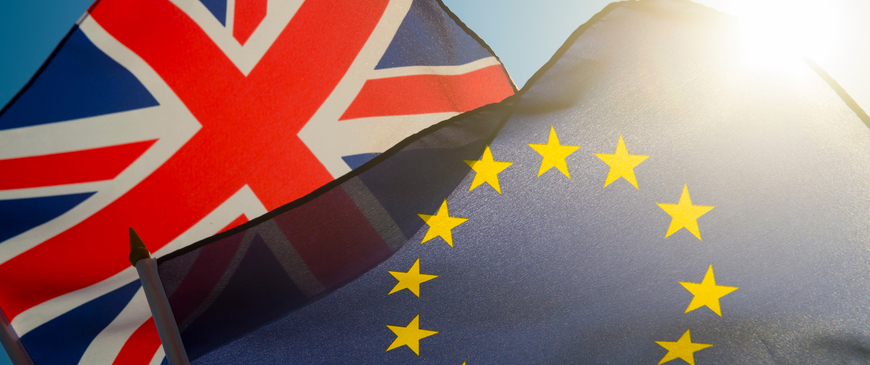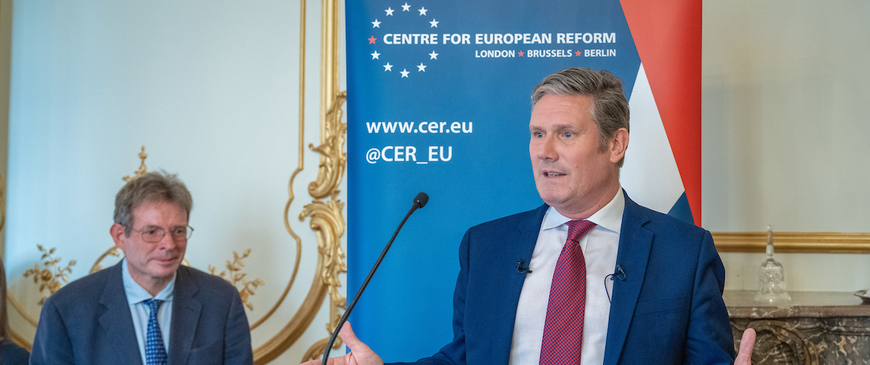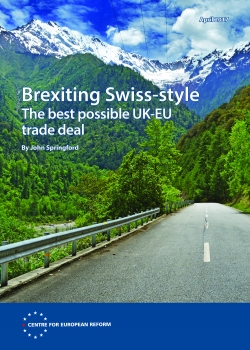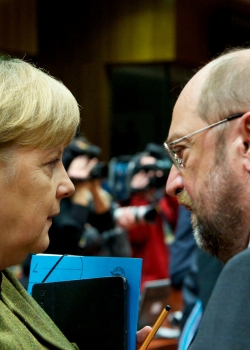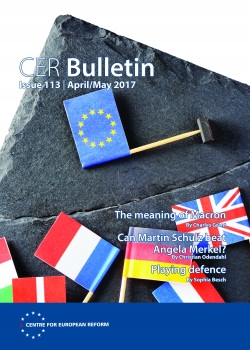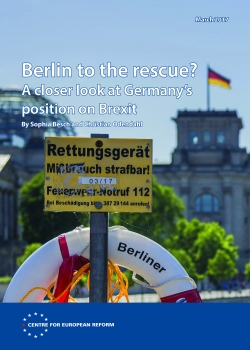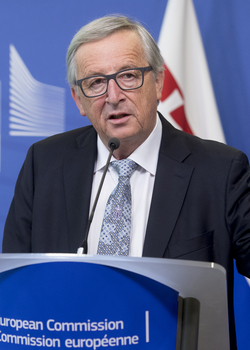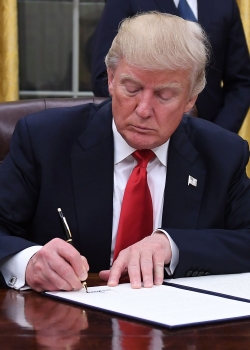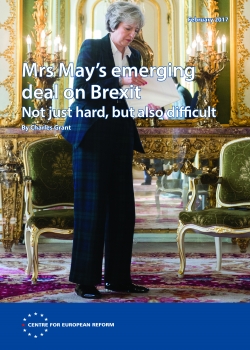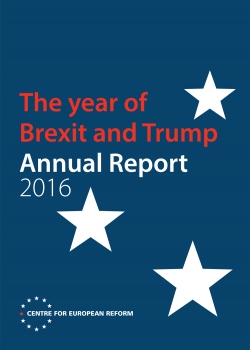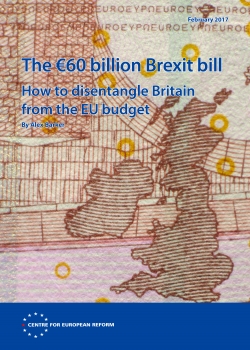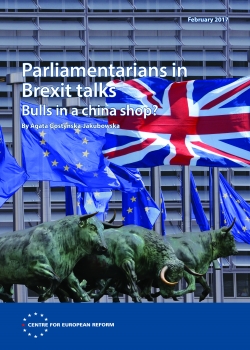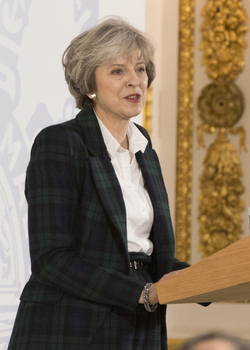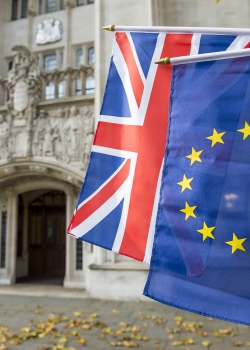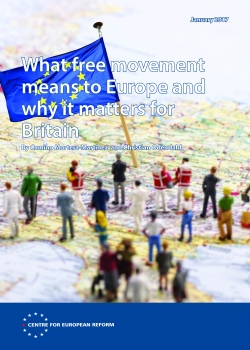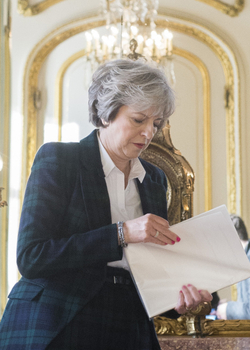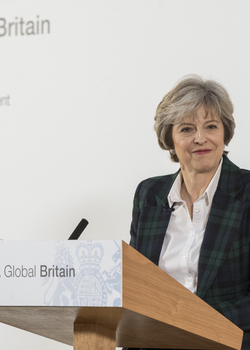Britain & EU member-states
The British and their exceptionalism
03 May 2017
Few countries have allowed their sense of exceptionalism to damage their interests in the way Britain is doing. British overconfidence is unjustified and will come at a heavy price.
Brexiting Swiss-style: The best possible UK-EU trade deal
24 April 2017
The softest form of hard Brexit that is plausible – given the red lines of the 27 and Britain – is something like Switzerland's deal with the EU.
The meaning of Macron
20 March 2017
The surge of support for Emmanuel Macron in France shows that liberal, pro-EU centrists may yet have a future in European politics. This would be good for the EU.
Can Martin Schulz beat Angela Merkel?
20 March 2017
A chancellor Schulz would be good news for the eurozone economy. But he would not differ much from Merkel on Brexit.
Playing defence
20 March 2017
The UK’s contributions to European defence will play a role in Brexit negotiations. But both sides should keep the long-term objective of close co-operation in mind.
Bulletin Issue 113 - April/May 2017
20 March 2017
- The meaning of Macron, Charles Grant
- Can Martin Schulz beat Angela Merkel?, Christian Odendahl
- Playing defence, Sophia Besch
Berlin to the rescue? A closer look at Germany's position on Brexit
17 March 2017
Brexiters hope that Berlin will adopt an accommodating stance in the forthcoming negotiations because of Germany's economic and security interests. Such hopes are misplaced.
Are the scenarios in Juncker’s White Paper on the future of the EU realistic?
03 March 2017
On Wednesday, the European Commission presented its ‘White Paper on the future of Europe’, ahead of the Treaty of Rome’s 60th anniversary celebrations on March 25th.
Trump, trade and the EU: Two wrongs don't make a right
23 February 2017
The US will not gain by resorting to protectionism. If it does so, the EU should stay calm, listen when US criticism is justified, and make its first priority the defence of the WTO process and the rule of law.
The end of the transatlantic trade consensus?
21 February 2017
Trump, Brexit and European scepticism about TTIP spell the end of transatlantic leadership on trade.
Mrs May's emerging deal on Brexit: Not just hard, but also difficult
20 February 2017
What will the Brexit deal look like? Which are the key decisions that Theresa May still has to make? And what should she do in order to get the best possible deal?
The year of Brexit and Trump: Annual report 2016
13 February 2017
The CER's annual report features essays on how Brexit and Trump are changing the world. It also highlights CER research on Brexit, economics, foreign policy and much else.
The €60 billion Brexit bill: How to disentangle Britain from the EU budget
06 February 2017
A stand-off between the EU and Britain over the size of its exit bill could lead to the collapse of negotiations and an abrupt, disorderly Brexit.
Parliamentarians in Brexit talks: Bulls in a china shop?
01 February 2017
David Davis promised that Westminster will have the same scrutiny powers in the Brexit talks as the European Parliament would. But what does that really mean?
May is weak in Europe but strong at home
26 January 2017
The EU-27 fear domestic politics will drive Britain towards a very hard Brexit. But Theresa May is strong enough at home to resist such pressures, if she wishes to.
Britain's economy: Enjoy the calm before the storm
26 January 2017
Britain's economy has not weathered the Brexit storm. But the calm before the storm has lasted longer than many economists expected.
What does the Supreme Court's ruling mean for British parliamentary sovereignty?
25 January 2017
The Supreme Court ruled that Theresa May needs to ask Parliament for its consent to notify of the UK's intention to leave the EU.
What free movement means to Europe and why it matters to Britain
19 January 2017
Britain and the EU-27 view migration very differently. That could complicate the Brexit and free trade negotiations.
What does Theresa May’s speech tell us about how Britain will leave the EU?
17 January 2017
Until now, Theresa May’s government has avoided being open about the trade-offs that Brexit entails: the more that Britain restores sovereignty, the greater the economic costs.
What does Theresa May's speech tell us about how Britain will leave the EU?
17 January 2017
Theresa May has decided on a hard Brexit, putting sovereignty ahead of economics. She thinks the negotiations will take only two years, but they will take longer.


